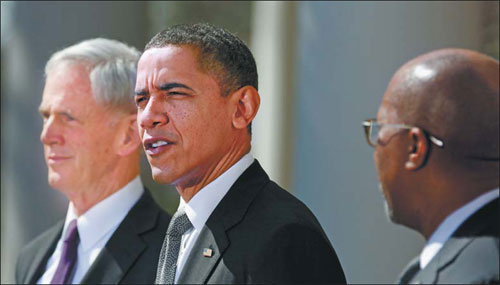Rare earth talks 'to start soon'
Updated: 2012-03-16 09:22
By Li Jiabao (China Daily)
|
||||||||
|
US President Barack Obama talks about a trade case against China with John Bryson, commerce secretary (left), and Ron Kirk, US trade representative, at the White House on Tuesday. The US, EU and Japan jointly requested consultations with China under the WTO framework in a challenge to China's restrictions on exports of rare earths. Haraz N. [Photo/China Daily] |
Consultations to begin with US, EU and Japan on restrictions
China will soon consult with the United States, European Union and Japan on the nation's export restrictions on rare earths, tungsten and molybdenum, the spokesman for the Ministry of Commerce said on Thursday.
"China will properly respond to the consultation request from the three (parties) following the dispute settlement procedure of the World Trade Organization, and consultations will soon start," Shen Danyang told a news conference in Beijing.
On Tuesday, the US, EU and Japan jointly requested consultations with China under the WTO in a challenge to China's restrictions on exports of rare earths, a group of 17 key elements used in high-technology products including hybrid car batteries, wind turbines and energy-efficient lighting.
Under WTO rules, China has 10 days to respond to the request. A failure to respond, or failure to reach agreements within 60 days, would lead to the establishment of an expert panel to investigate and rule on the case.
"China's policy of managing the export of raw materials is justified and in line with WTO rules. It aims to protect the environment and resources, and it is not intended to limit free trade, nor to distort trade for the protection of domestic industries," Shen said.
Li Chenggang, head of the ministry's department of treaty and law, told China Daily on Tuesday that he is "neither optimistic nor pessimistic about the final result of the case".
Sang Baichuan, dean of the Institute of International Business at the University of International Business and Economics, expressed worries that China has a high possibility of losing the case.
"The rare earths case is a follow-on from the dispute on China's restrictions of nine raw materials. But the WTO did not support China's claim of environmental protection and resource exhaustion in its ruling in January," Sang said.
The rare earths case came as US President Barack Obama approved a bill on Tuesday to impose countervailing duties on non-market economy goods.
US Trade Representative Ron Kirk said on Wednesday that "the launch of the case against China, along with the creation of the Interagency Trade Enforcement Center, reflects the Obama administration's commitment to make all of our trading partners play by the rules".
Shen said that China rationally determines annual export quotas after considering domestic and global market conditions, as well as the carrying capacity of resources and the environment.
The quota "roughly meets the normal demand in the global market, which shows that China is a responsible member of the WTO", Shen added.
China supplies more than 90 percent of the world's rare earths demand. Its reserves account for 36.4 percent of the world's total.
Foreign trade
Turning to trade, the deficit situation of the first two months of the year isn't likely to persist throughout the year, and the government will take steps to stabilize foreign trade, Shen said.
The trade deficit in February, at $31.49 billion, "was mainly caused by the (Lunar New Year) holiday distortion and is not likely to continue through the year", he said.
"Overall, China will have a trade surplus in 2012, though the surplus will continue to narrow, and its contribution to the GDP growth will further drop amid the pursuit of more balanced trade," he added.
China's exports in February rose 18.4 percent year-on-year to $114.47 billion, while imports surged 39.6 percent to $145.96 billion, according to the General Administration of Customs.
Shen added that "appropriate rises in labor costs will upgrade exporting industries, optimize the manpower structure and drive exporters to invest more in research and design and overseas sales networks".
lijiabao@chinadaily.com.cn

 Relief reaches isolated village
Relief reaches isolated village
 Rainfall poses new threats to quake-hit region
Rainfall poses new threats to quake-hit region
 Funerals begin for Boston bombing victims
Funerals begin for Boston bombing victims
 Quake takeaway from China's Air Force
Quake takeaway from China's Air Force
 Obama celebrates young inventors at science fair
Obama celebrates young inventors at science fair
 Earth Day marked around the world
Earth Day marked around the world
 Volunteer team helping students find sense of normalcy
Volunteer team helping students find sense of normalcy
 Ethnic groups quick to join rescue efforts
Ethnic groups quick to join rescue efforts
Most Viewed
Editor's Picks

|

|

|

|

|

|
Today's Top News
Health new priority for quake zone
Xi meets US top military officer
Japan's boats driven out of Diaoyu
China mulls online shopping legislation
Bird flu death toll rises to 22
Putin appoints new ambassador to China
Japanese ships blocked from Diaoyu Islands
Inspired by Guan, more Chinese pick up golf
US Weekly

|

|








